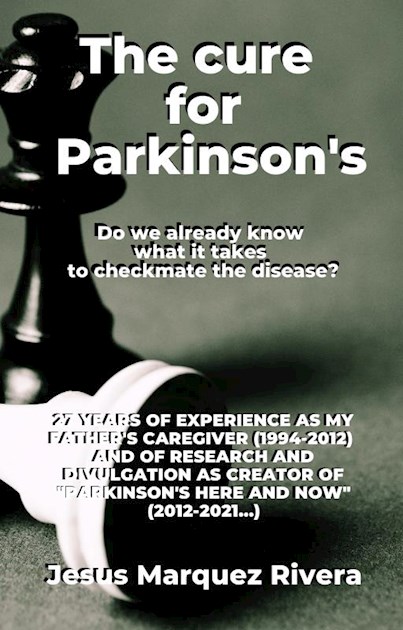(Taken from chapter 26: Traditional Chinese Medicine: a "hidden" wonder behind a different vision; from book "The cure for Parkinson's. Do we already know what it takes to checkmate the disease?".)
I will try to finish the translation as soon as possible. Back in battle...
---
"I come from the depths of the Ages,
when the world was beginning to be born...
I am as old and as new as the light of each day!
Mario Quintana, Brazilian poet
"A person who does not know the history
of the last 3,000 years, wanders in the darkness of ignorance,
unable to make sense of the reality around him".
Goethe
"1. Acupuncture.
This therapy has been practised for more than two thousand years. It is based on the insertion of very fine needles in specific points situated on meridians that run through the body according to Traditional Chinese Medicine with the intention of restoring the patient's health, relieving pain, etc.
Today, no one who is moderately informed can deny the reality of the health benefits of acupuncture and certain aspects of Parkinson's disease. Despite this, the Internet is rife with sites labelling it as pseudoscience, placebo or hoax. Never mind that the studies achieve benefits with animals and humans, with objective measurements of substances in the brain, the use of brain scans (Danqing 2015), etc.
In 1971, a journalist of the "New York Times" published an article about his very positive experiences with acupuncture and pain after an appendicitis operation in China, which sparked interest in the United States in this therapy.
In 1999, the National Center for Complementary and Alternative Medicine was established within the US NIH. Acupuncture has become the most popular alternative medicine in the United States (Wang 2008).
In November 2010 "acupuncture and moxibustion of Traditional Chinese Medicine" were inscribed on the UNESCO Representative List of the Intangible Cultural Heritage of Humanity.
Acupuncture and Parkinson's disease.
Studies on the benefits of acupuncture alone or in conjunction with other therapies in both animals and humans for neurodegenerative diseases and Parkinson's disease in particular began to appear 20-30 years ago (Asakawa 2016). Electro-acupuncture appears to be very effective. Also acupuncture applied to the ear or head (Liu 1974, Lee 2013).
Once again, we recommend the classic text by neurologist González Maldonado, "Heterodox treatments in Parkinson's disease".
Numerous recent rigorous studies have confirmed what traditional use and pioneering studies have said: acupuncture is beneficial for Parkinsonians (Manyam 1999).
In one study of 29 Parkinsonians, acupuncture significantly improved clinical signs and symptoms, slowed disease progression, and reduced drug dosage (Zhuang 2000).
In another study, acupuncture together with Chinese massage (tuina) improved tremor, rigidity, dyskinesias and balance, regardless of disease stage (Walton-Hadlock 1999).
A randomised controlled trial (RCT) is the test that meets the requirements for demonstrating the efficacy of a substance or therapy.
In 2018, Jiang and Asakawa published a review analysing 7 RCT studies and 4 meta-analyses on the efficacy of acupuncture. The therapy may provide relief by affecting the progression of neuronal degeneration, enhancing the dopaminergic system, improving the motor control network and alleviating oxidative stress (Asakawa 2013). In the 2013 study he had reviewed those published from 1974 to 2012.
Motor symptoms improve with acupuncture: an RCT study with 15 patients and the use of electroacupuncture improved UPDRS and gait speed (Lei 2016), objectively showing its benefits. And it was consistent with other RCTs, with 63 patients (Cho 2017) and with 366 (Lee 2017).
Acupuncture is effective against non-motor symptoms: Parkinson's-related stress and tension (Noh 2017), for relieving fatigue (Kluger 2016) and drowsiness (Liang 2014, Wang 2015).
There have even been studies on the increased efficacy of combining acupuncture with Madopar, levodopa with benserazide (Ren 2008, Liu 2017).
The latest studies delve into the different aspects in which acupuncture benefits Parkinson's patients (Jiang 2018, Guo 2019, Lai 2019, Huang 2020 and Weng 2021 - meta-analysis).
Researchers from the University of Seoul (South Korea) published a study on the effects of acupuncture on certain brain regions in the journal "CNS Neuroscience & Therapeutics".
Yeo, S., Lim and their team used functional magnetic resonance imaging (fMRI) to measure the specific effects of needling the GB34 (Yanglinqquan) acupoint on parts of the brain affected by Parkinson's disease. 12 patients and 12 healthy controls participated. All were scanned before and after acupuncture.
They found that acupuncture stimulates better neural responses in the following brain regions: the basal ganglia, putamen, thalamus, caudate and substantia nigra, all of which are associated with Parkinson's disease (Yeo 2012).
Some studies aim to show that the potential benefits of acupuncture depend only on the use of the needles, regardless of where they are inserted, increasing adenosine levels (Goldman 2010). But there are numerous studies that show that they do depend on the insertion point. Even if we don't know the scientific explanation yet.
The controversy will never be resolved.
